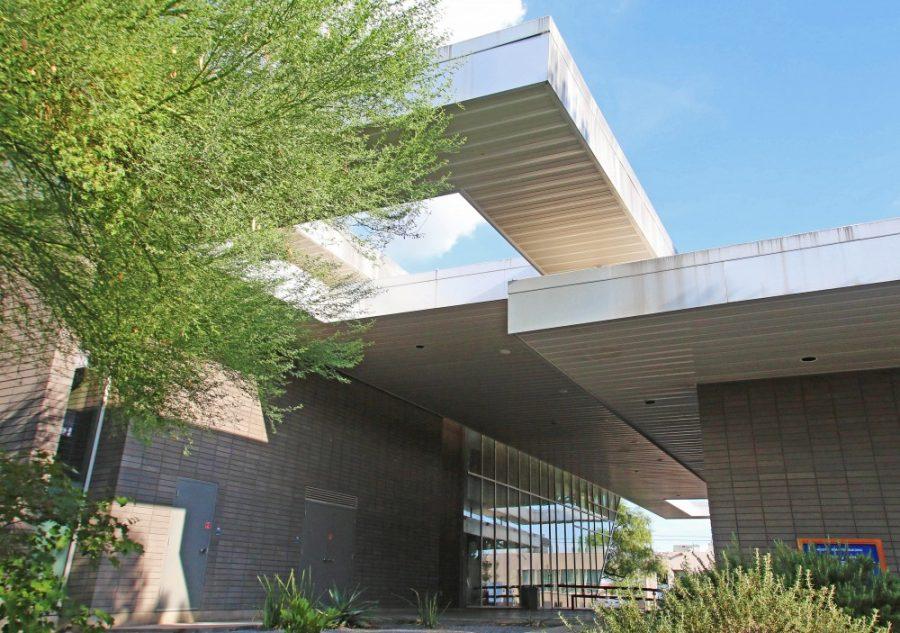The University of Arizona Poetry Center is looking to give some unique artists a chance to confront issues in the justice system, thanks to a new grant.
The UA Poetry Center recently began a writing residency program in juvenile detention centers. The center’s efforts to provide support to incarcerated individuals will reach further with a recent endowment of $500,000, which came from an Art for Justice grant.
Started by philanthropist Agnes Gund in partnership with the Ford Foundation and Rockefeller Philanthropy Advisors, the Art for Justice Fund is a five-year project that aims to use voices of artists to spread awareness about mass incarceration.
The Poetry Center, located on the north side of campus, north of Speedway Boulevard between Vine and Rincon Avenues, greets visitors with angled glass walls and a small outdoor odeum, ensuring that at first glance, the structure clearly serves an artistic purpose.
Established in 1960 by philanthropist, writer and editor Ruth Stephan, the Poetry Center started its regular Reading and Lecture Series in 1962. Today, the Poetry Center offers numerous events and classes for university students and community members across Arizona.
Permanently housed in the Helen S. Schaefer Building since 2007, the center also houses a library with thousands of books and is open to the public.
The Executive Director of the Poetry Center, Tyler Meier, described how Ruth Stephan enabled the center’s creation: “Ruth Stephan made a gift to the UA with two thousand-square-foot adobe cottages. She envisioned that one would hold a collection of books — many from her own collection — and the other would house poets.”
RELATED: Love in the time of reflection: LGBT senior poets share their work
Meier also explained that Stephan financed the Poetry Center because of her own interest in poetry. She gave the gift of the two houses and a large endowment, plus a manifesto of her vision of how the books would be collected — guidelines which, Meier said, the Poetry Center ensures to follow today.
The Poetry Center is a part of the College of Humanities and, as such, serves UA students and faculty with its numerous workshops and resources.
Meier explained, “We have a wonderful Reading and Lecture Series, the hallmark of our program. We present nationally recognized and important voices to the community.”
He also described how the Poetry Center has multiple community partnerships that lets students from education, creative writing and rhetoric and composition courses engage in learning and field trips through the center.
“This year,” Meier said, “Honors College first-year students in the catalyst program come to the Poetry Center and explore themes of justice and incarceration through poetry.”
Meier expressed appreciation for the new arrangement, hoping that “everyone has an experience of the Poetry Center early on in their college careers.”
Honors Catalyst is a class required for honors freshmen in which themes of the year’s common reading book are explored. Justice and incarceration are themes central to this year’s book, “Just Mercy.”
The Poetry Center brings workshops, and speakers, to people that are incarcerated all over the state.
“We’ve supported a prison writing program … and that effort has had really incredible outcomes,” Meier said. “We’ve saved lives, or improved them in a really powerful and important way. When you’re writing, you’re accomplishing something only you can accomplish … often a feeling that gets stripped away when you’re incarcerated … [Writing is] an affirmation of someone’s humanness.”
Meier said many incarcerated individuals feel dehumanized in prison, and he hopes the Poetry Center’s initiative has helped some of them.
“Whatever future we all have on this Earth, we’ll have to do it together. We [at the Poetry Center] value the idea of a collaborative future,” he said.
RELATED: Annual Poetry Festival shares authors with Tucson
The Poetry Center will use the Art for Justice grant to commission poets to write pieces that illuminate what the artists view as the unfairness, and brutality, of the criminal justice system.
“Mass incarceration — how we think about it, what future it will have to who we are as a country — poetry gives us the imagination to think about that differently,” Meier said. “To be able to move beyond crisis, we have to imagine our way past it. It’s the best tool we have, to imagine broadly.”
Follow Jahnavi Akellaon Twitter















